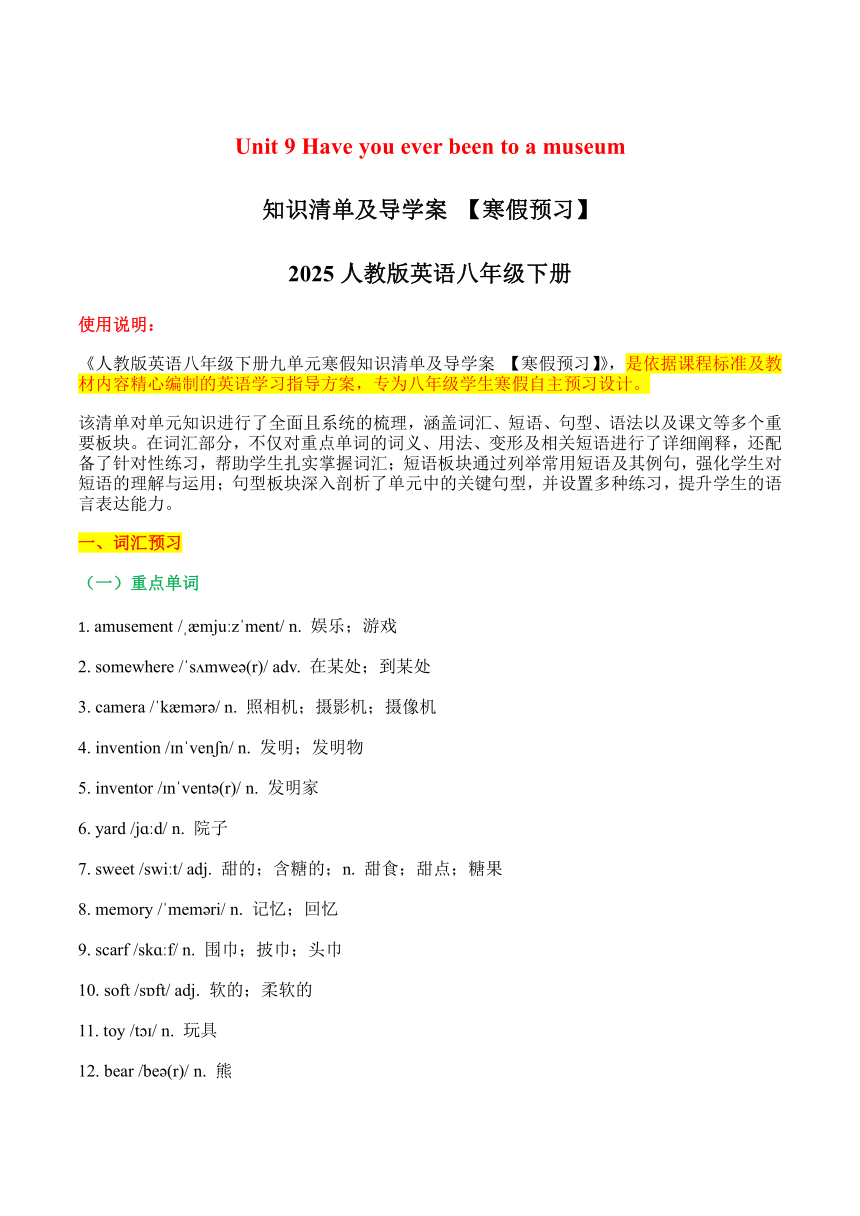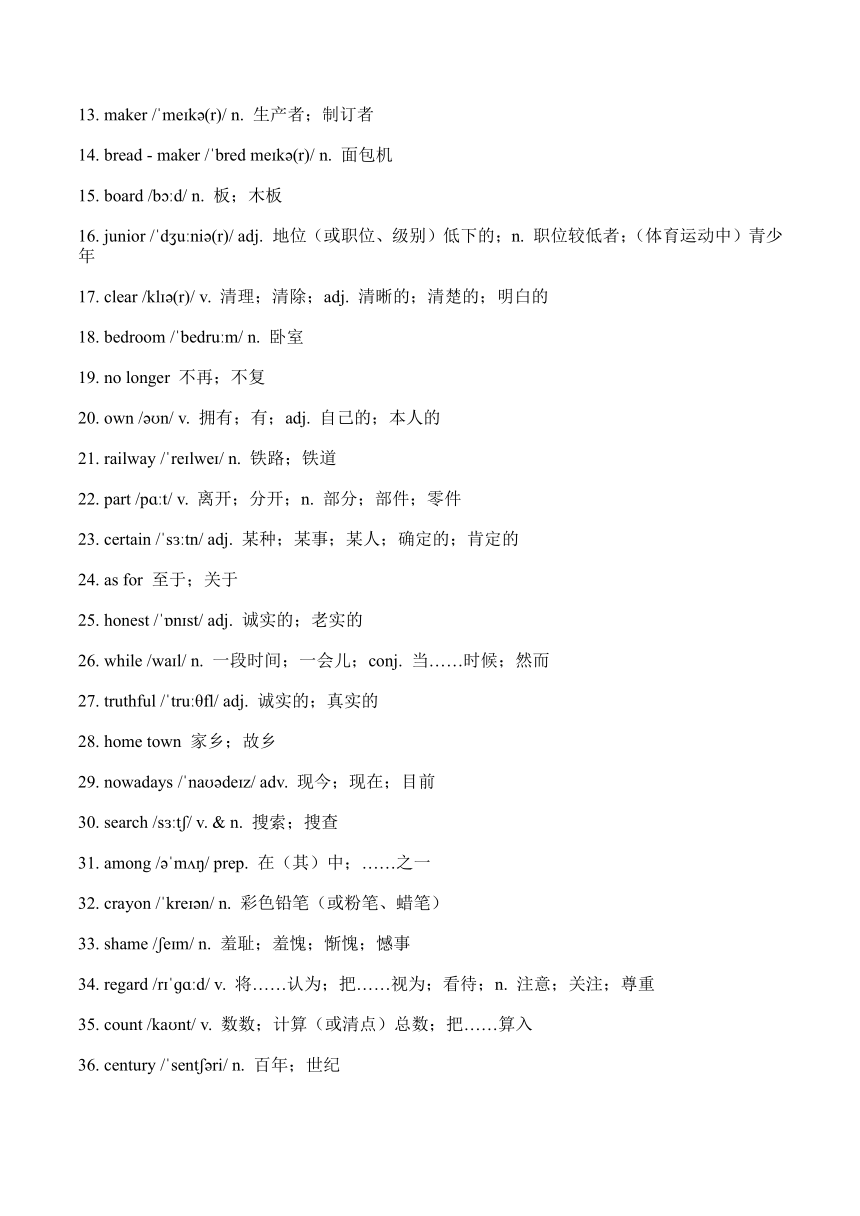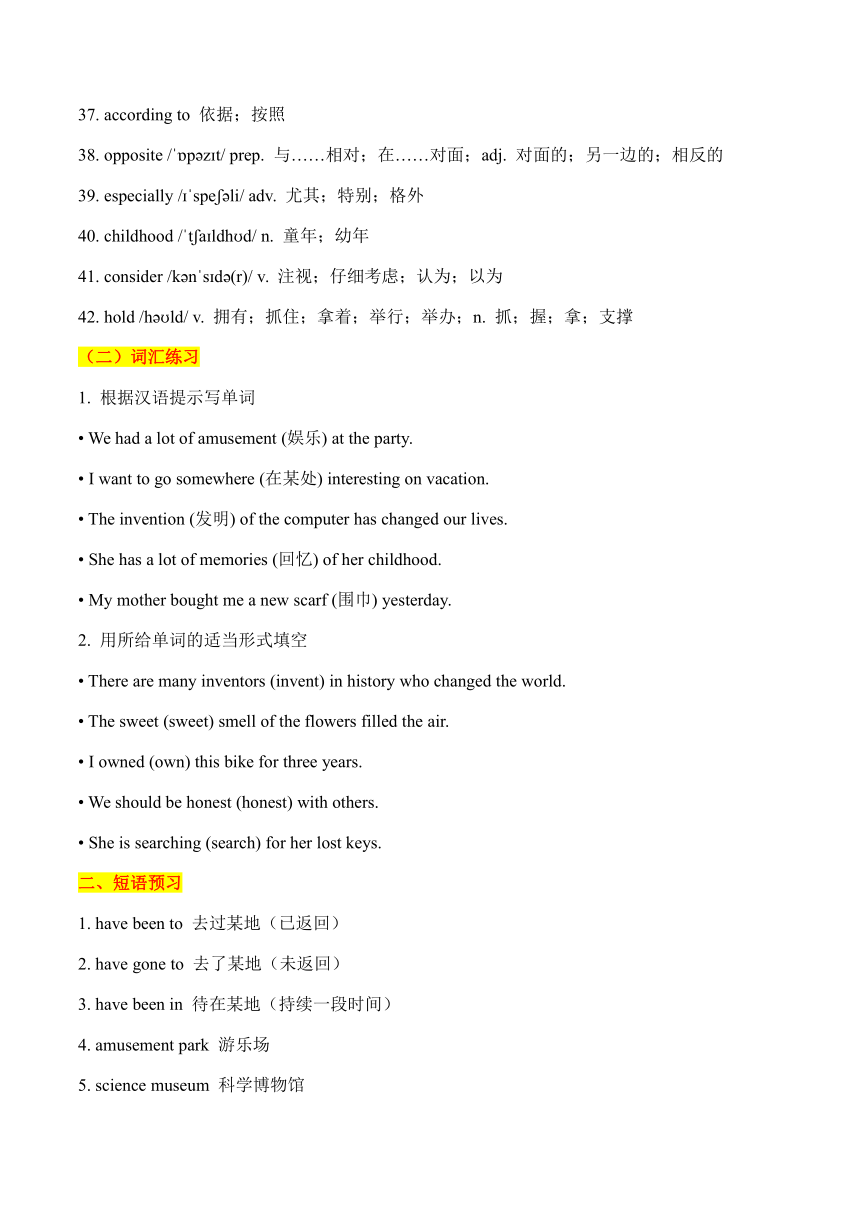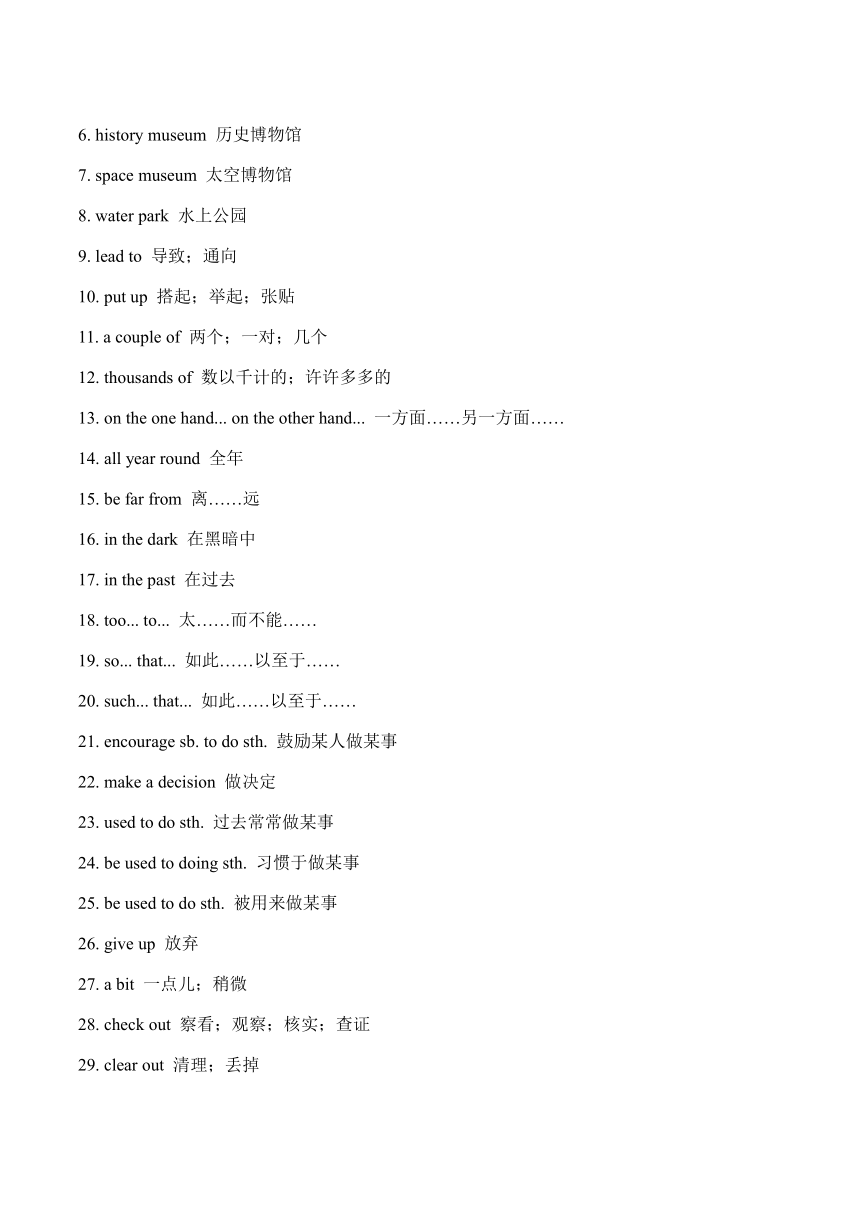寒假预习 Unit 9 Have you ever been to a museum?知识清单 2024-2025学年人教版八年级英语下册
文档属性
| 名称 | 寒假预习 Unit 9 Have you ever been to a museum?知识清单 2024-2025学年人教版八年级英语下册 |  | |
| 格式 | docx | ||
| 文件大小 | 28.4KB | ||
| 资源类型 | 教案 | ||
| 版本资源 | 人教新目标(Go for it)版 | ||
| 科目 | 英语 | ||
| 更新时间 | 2025-01-12 21:15:14 | ||
图片预览




文档简介
Unit 9 Have you ever been to a museum
知识清单及导学案 【寒假预习】
2025人教版英语八年级下册
使用说明:
《人教版英语八年级下册九单元寒假知识清单及导学案 【寒假预习】》,是依据课程标准及教材内容精心编制的英语学习指导方案,专为八年级学生寒假自主预习设计。
该清单对单元知识进行了全面且系统的梳理,涵盖词汇、短语、句型、语法以及课文等多个重要板块。在词汇部分,不仅对重点单词的词义、用法、变形及相关短语进行了详细阐释,还配备了针对性练习,帮助学生扎实掌握词汇;短语板块通过列举常用短语及其例句,强化学生对短语的理解与运用;句型板块深入剖析了单元中的关键句型,并设置多种练习,提升学生的语言表达能力。
一、词汇预习
重点单词
1. amusement / mju z ment/ n. 娱乐;游戏
2. somewhere / s mwe (r)/ adv. 在某处;到某处
3. camera / k m r / n. 照相机;摄影机;摄像机
4. invention / n ven n/ n. 发明;发明物
5. inventor / n vent (r)/ n. 发明家
6. yard /jɑ d/ n. 院子
7. sweet /swi t/ adj. 甜的;含糖的;n. 甜食;甜点;糖果
8. memory / mem ri/ n. 记忆;回忆
9. scarf /skɑ f/ n. 围巾;披巾;头巾
10. soft /s ft/ adj. 软的;柔软的
11. toy /t / n. 玩具
12. bear /be (r)/ n. 熊
13. maker / me k (r)/ n. 生产者;制订者
14. bread - maker / bred me k (r)/ n. 面包机
15. board /b d/ n. 板;木板
16. junior / d u ni (r)/ adj. 地位(或职位、级别)低下的;n. 职位较低者;(体育运动中)青少年
17. clear /kl (r)/ v. 清理;清除;adj. 清晰的;清楚的;明白的
18. bedroom / bedru m/ n. 卧室
19. no longer 不再;不复
20. own / n/ v. 拥有;有;adj. 自己的;本人的
21. railway / re lwe / n. 铁路;铁道
22. part /pɑ t/ v. 离开;分开;n. 部分;部件;零件
23. certain / s tn/ adj. 某种;某事;某人;确定的;肯定的
24. as for 至于;关于
25. honest / n st/ adj. 诚实的;老实的
26. while /wa l/ n. 一段时间;一会儿;conj. 当……时候;然而
27. truthful / tru θfl/ adj. 诚实的;真实的
28. home town 家乡;故乡
29. nowadays / na de z/ adv. 现今;现在;目前
30. search /s t / v. & n. 搜索;搜查
31. among / m / prep. 在(其)中;……之一
32. crayon / kre n/ n. 彩色铅笔(或粉笔、蜡笔)
33. shame / e m/ n. 羞耻;羞愧;惭愧;憾事
34. regard /r ɡɑ d/ v. 将……认为;把……视为;看待;n. 注意;关注;尊重
35. count /ka nt/ v. 数数;计算(或清点)总数;把……算入
36. century / sent ri/ n. 百年;世纪
37. according to 依据;按照
38. opposite / p z t/ prep. 与……相对;在……对面;adj. 对面的;另一边的;相反的
39. especially / spe li/ adv. 尤其;特别;格外
40. childhood / t a ldh d/ n. 童年;幼年
41. consider /k n s d (r)/ v. 注视;仔细考虑;认为;以为
42. hold /h ld/ v. 拥有;抓住;拿着;举行;举办;n. 抓;握;拿;支撑
(二)词汇练习
1. 根据汉语提示写单词
We had a lot of amusement (娱乐) at the party.
I want to go somewhere (在某处) interesting on vacation.
The invention (发明) of the computer has changed our lives.
She has a lot of memories (回忆) of her childhood.
My mother bought me a new scarf (围巾) yesterday.
2. 用所给单词的适当形式填空
There are many inventors (invent) in history who changed the world.
The sweet (sweet) smell of the flowers filled the air.
I owned (own) this bike for three years.
We should be honest (honest) with others.
She is searching (search) for her lost keys.
二、短语预习
1. have been to 去过某地(已返回)
2. have gone to 去了某地(未返回)
3. have been in 待在某地(持续一段时间)
4. amusement park 游乐场
5. science museum 科学博物馆
6. history museum 历史博物馆
7. space museum 太空博物馆
8. water park 水上公园
9. lead to 导致;通向
10. put up 搭起;举起;张贴
11. a couple of 两个;一对;几个
12. thousands of 数以千计的;许许多多的
13. on the one hand... on the other hand... 一方面……另一方面……
14. all year round 全年
15. be far from 离……远
16. in the dark 在黑暗中
17. in the past 在过去
18. too... to... 太……而不能……
19. so... that... 如此……以至于……
20. such... that... 如此……以至于……
21. encourage sb. to do sth. 鼓励某人做某事
22. make a decision 做决定
23. used to do sth. 过去常常做某事
24. be used to doing sth. 习惯于做某事
25. be used to do sth. 被用来做某事
26. give up 放弃
27. a bit 一点儿;稍微
28. check out 察看;观察;核实;查证
29. clear out 清理;丢掉
30. part with 放弃、交出(尤指不舍得的东西)
31. as for 至于;关于
32. to be honest 说实在的
33. for a while 一会儿
34. search for 寻找;搜寻
35. regard... as... 把……看作……
36. according to 依据;按照
37. in one's opinion 依某人看
短语练习
1. 翻译短语
去过北京:have been to Beijing
去了上海:have gone to Shanghai
在历史博物馆:in the history museum
数以千计的游客:thousands of tourists
鼓励我努力学习:encourage me to study hard
2. 用适当的短语填空
I have been to (去过) the Great Wall twice.
My father has gone to (去了) Guangzhou on business.
There are thousands of (数以千计的) books in the library.
Teachers should encourage students to (鼓励学生) think independently.
In my opinion (依我看), we should protect the environment.
三、句型预习
1. 现在完成时的特殊疑问句
结构:特殊疑问词 + have/has + 主语 + 过去分词 + 其他
例句:Where have you been these days (这些天你去哪里了?)
2. It's + adj. + to do sth. 做某事是……的
例句:It's interesting to visit the amusement park.(去游乐园玩很有趣。)
3. How long have/has... 询问动作或状态持续的时间
回答:常用“for + 时间段”或“since + 过去时间点/一般过去时的句子”
例句:How long have you had this book (你拥有这本书多久了?) I have had it for two weeks.(我拥有它两周了。)
4. What about doing sth. 提出建议,做某事怎么样?
例句:What about going to the movies tonight (今晚去看电影怎么样?)
5. used to do sth. 过去常常做某事
否定形式:didn't use to do sth. 或 usedn't to do sth.
一般疑问句:Did + 主语 + use to do sth. 或 Used + 主语 + to do sth.
例句:He used to play football after school.(他过去放学后常常踢足球。)
句型练习
1. 完成句子
你曾经去过国外吗?
Have you ever been abroad
对我们来说保持健康很重要。
It's important for us to keep healthy
你学英语多长时间了?
How long have you learned English
去公园骑自行车怎么样?
What about going cycling in the park
她过去不常看电视。
She didn't use to watch TV 或 She usedn't to watch TV
2. 句型转换
I have been to the zoo three times. (对划线部分提问)
How many times have you been to the zoo
She has lived in this city since 2010. (对划线部分提问)
How long has she lived in this city
四、语法预习
现在完成时与一般过去时的区别
1. 现在完成时
概念:过去发生的动作对现在造成的影响或结果;过去已经开始,持续到现在的动作或状态。
构成:have/has + 过去分词
标志词:already(已经,用于肯定句)、yet(已经;还,用于否定句和疑问句)、ever(曾经)、never(从不)、just(刚刚)、for + 时间段、since + 过去时间点/一般过去时的句子 等。
例句:I have finished my homework.(我已经完成了作业。强调现在作业已完成 ) He has lived here for ten years.(他在这里住了十年了。强调从过去到现在的持续状态 )
2. 一般过去时
概念:过去某个时间发生的动作或存在的状态。
构成:动词的过去式
标志词:yesterday(昨天)、last week(上周)、in 2020(在2020年)、two days ago(两天前)等具体的过去时间状语。
例句:I went to the park yesterday.(我昨天去了公园。强调昨天发生的动作 )
3. 区别
现在完成时强调过去的动作与现在的联系,不与具体的过去时间状语连用;一般过去时只强调过去的动作或状态,与现在无关,常与具体的过去时间状语连用。
例句:I have seen the movie.(我看过这部电影了。现在知道电影内容 ) I saw the movie last night.(我昨晚看了这部电影。强调看电影的动作发生在昨晚 )
语法练习
1. 用所给动词的适当形式填空
I saw (see) the film last night.
Have you had (have) your lunch yet
He lived (live) in Beijing two years ago.
They have been (be) friends since they met in 2015.
She didn't go (not go) to school yesterday because she was ill.
2. 单项选择
( ) 1. —______ you ______ your homework yet
—Yes, I ______ it ten minutes ago.
A. Did; do; finished B. Have; done; have finished C. Have; done; finished
答案:C
( ) 2. I ______ in the hospital yesterday.
A. am B. was C. have been
答案:B
( ) 3. She has ______ this book for two weeks.
A. bought B. borrowed C. kept
答案:C
五、课文预习
1. 预习方法
听录音跟读:先听课文录音,模仿语音、语调、连读等发音技巧,然后大声跟读,培养语感。
通读课文:了解文章的大致内容,标记出不懂的单词和句子,便于之后查阅资料或请教他人。
分析结构:梳理文章的段落结构,找出主题句和关键信息,理解文章的逻辑关系。
整理笔记:将文中的重点词汇、短语、句型以及自己的疑问记录下来,便于复习和请教他人。
2. 课文内容梳理
Section A:围绕去过的有趣的地方展开,如游乐园、博物馆等。通过对话和文章学习,掌握如何运用现在完成时谈论过去的经历,同时学习一些与娱乐、发明相关的词汇和表达。
Section B:主要讲述了人们对旧物的情感和处理方式,如举办庭院拍卖会、捐赠物品等。涉及到现在完成时表示动作持续的用法,以及一些关于回忆、家乡等主题的词汇和短语。
Self - Check:通过多种练习形式,如词汇填空、句型转换、短文写作等,对本单元所学的词汇、语法和句型进行综合检测和复习,帮助同学们查漏补缺,强化对知识的掌握。
知识清单及导学案 【寒假预习】
2025人教版英语八年级下册
使用说明:
《人教版英语八年级下册九单元寒假知识清单及导学案 【寒假预习】》,是依据课程标准及教材内容精心编制的英语学习指导方案,专为八年级学生寒假自主预习设计。
该清单对单元知识进行了全面且系统的梳理,涵盖词汇、短语、句型、语法以及课文等多个重要板块。在词汇部分,不仅对重点单词的词义、用法、变形及相关短语进行了详细阐释,还配备了针对性练习,帮助学生扎实掌握词汇;短语板块通过列举常用短语及其例句,强化学生对短语的理解与运用;句型板块深入剖析了单元中的关键句型,并设置多种练习,提升学生的语言表达能力。
一、词汇预习
重点单词
1. amusement / mju z ment/ n. 娱乐;游戏
2. somewhere / s mwe (r)/ adv. 在某处;到某处
3. camera / k m r / n. 照相机;摄影机;摄像机
4. invention / n ven n/ n. 发明;发明物
5. inventor / n vent (r)/ n. 发明家
6. yard /jɑ d/ n. 院子
7. sweet /swi t/ adj. 甜的;含糖的;n. 甜食;甜点;糖果
8. memory / mem ri/ n. 记忆;回忆
9. scarf /skɑ f/ n. 围巾;披巾;头巾
10. soft /s ft/ adj. 软的;柔软的
11. toy /t / n. 玩具
12. bear /be (r)/ n. 熊
13. maker / me k (r)/ n. 生产者;制订者
14. bread - maker / bred me k (r)/ n. 面包机
15. board /b d/ n. 板;木板
16. junior / d u ni (r)/ adj. 地位(或职位、级别)低下的;n. 职位较低者;(体育运动中)青少年
17. clear /kl (r)/ v. 清理;清除;adj. 清晰的;清楚的;明白的
18. bedroom / bedru m/ n. 卧室
19. no longer 不再;不复
20. own / n/ v. 拥有;有;adj. 自己的;本人的
21. railway / re lwe / n. 铁路;铁道
22. part /pɑ t/ v. 离开;分开;n. 部分;部件;零件
23. certain / s tn/ adj. 某种;某事;某人;确定的;肯定的
24. as for 至于;关于
25. honest / n st/ adj. 诚实的;老实的
26. while /wa l/ n. 一段时间;一会儿;conj. 当……时候;然而
27. truthful / tru θfl/ adj. 诚实的;真实的
28. home town 家乡;故乡
29. nowadays / na de z/ adv. 现今;现在;目前
30. search /s t / v. & n. 搜索;搜查
31. among / m / prep. 在(其)中;……之一
32. crayon / kre n/ n. 彩色铅笔(或粉笔、蜡笔)
33. shame / e m/ n. 羞耻;羞愧;惭愧;憾事
34. regard /r ɡɑ d/ v. 将……认为;把……视为;看待;n. 注意;关注;尊重
35. count /ka nt/ v. 数数;计算(或清点)总数;把……算入
36. century / sent ri/ n. 百年;世纪
37. according to 依据;按照
38. opposite / p z t/ prep. 与……相对;在……对面;adj. 对面的;另一边的;相反的
39. especially / spe li/ adv. 尤其;特别;格外
40. childhood / t a ldh d/ n. 童年;幼年
41. consider /k n s d (r)/ v. 注视;仔细考虑;认为;以为
42. hold /h ld/ v. 拥有;抓住;拿着;举行;举办;n. 抓;握;拿;支撑
(二)词汇练习
1. 根据汉语提示写单词
We had a lot of amusement (娱乐) at the party.
I want to go somewhere (在某处) interesting on vacation.
The invention (发明) of the computer has changed our lives.
She has a lot of memories (回忆) of her childhood.
My mother bought me a new scarf (围巾) yesterday.
2. 用所给单词的适当形式填空
There are many inventors (invent) in history who changed the world.
The sweet (sweet) smell of the flowers filled the air.
I owned (own) this bike for three years.
We should be honest (honest) with others.
She is searching (search) for her lost keys.
二、短语预习
1. have been to 去过某地(已返回)
2. have gone to 去了某地(未返回)
3. have been in 待在某地(持续一段时间)
4. amusement park 游乐场
5. science museum 科学博物馆
6. history museum 历史博物馆
7. space museum 太空博物馆
8. water park 水上公园
9. lead to 导致;通向
10. put up 搭起;举起;张贴
11. a couple of 两个;一对;几个
12. thousands of 数以千计的;许许多多的
13. on the one hand... on the other hand... 一方面……另一方面……
14. all year round 全年
15. be far from 离……远
16. in the dark 在黑暗中
17. in the past 在过去
18. too... to... 太……而不能……
19. so... that... 如此……以至于……
20. such... that... 如此……以至于……
21. encourage sb. to do sth. 鼓励某人做某事
22. make a decision 做决定
23. used to do sth. 过去常常做某事
24. be used to doing sth. 习惯于做某事
25. be used to do sth. 被用来做某事
26. give up 放弃
27. a bit 一点儿;稍微
28. check out 察看;观察;核实;查证
29. clear out 清理;丢掉
30. part with 放弃、交出(尤指不舍得的东西)
31. as for 至于;关于
32. to be honest 说实在的
33. for a while 一会儿
34. search for 寻找;搜寻
35. regard... as... 把……看作……
36. according to 依据;按照
37. in one's opinion 依某人看
短语练习
1. 翻译短语
去过北京:have been to Beijing
去了上海:have gone to Shanghai
在历史博物馆:in the history museum
数以千计的游客:thousands of tourists
鼓励我努力学习:encourage me to study hard
2. 用适当的短语填空
I have been to (去过) the Great Wall twice.
My father has gone to (去了) Guangzhou on business.
There are thousands of (数以千计的) books in the library.
Teachers should encourage students to (鼓励学生) think independently.
In my opinion (依我看), we should protect the environment.
三、句型预习
1. 现在完成时的特殊疑问句
结构:特殊疑问词 + have/has + 主语 + 过去分词 + 其他
例句:Where have you been these days (这些天你去哪里了?)
2. It's + adj. + to do sth. 做某事是……的
例句:It's interesting to visit the amusement park.(去游乐园玩很有趣。)
3. How long have/has... 询问动作或状态持续的时间
回答:常用“for + 时间段”或“since + 过去时间点/一般过去时的句子”
例句:How long have you had this book (你拥有这本书多久了?) I have had it for two weeks.(我拥有它两周了。)
4. What about doing sth. 提出建议,做某事怎么样?
例句:What about going to the movies tonight (今晚去看电影怎么样?)
5. used to do sth. 过去常常做某事
否定形式:didn't use to do sth. 或 usedn't to do sth.
一般疑问句:Did + 主语 + use to do sth. 或 Used + 主语 + to do sth.
例句:He used to play football after school.(他过去放学后常常踢足球。)
句型练习
1. 完成句子
你曾经去过国外吗?
Have you ever been abroad
对我们来说保持健康很重要。
It's important for us to keep healthy
你学英语多长时间了?
How long have you learned English
去公园骑自行车怎么样?
What about going cycling in the park
她过去不常看电视。
She didn't use to watch TV 或 She usedn't to watch TV
2. 句型转换
I have been to the zoo three times. (对划线部分提问)
How many times have you been to the zoo
She has lived in this city since 2010. (对划线部分提问)
How long has she lived in this city
四、语法预习
现在完成时与一般过去时的区别
1. 现在完成时
概念:过去发生的动作对现在造成的影响或结果;过去已经开始,持续到现在的动作或状态。
构成:have/has + 过去分词
标志词:already(已经,用于肯定句)、yet(已经;还,用于否定句和疑问句)、ever(曾经)、never(从不)、just(刚刚)、for + 时间段、since + 过去时间点/一般过去时的句子 等。
例句:I have finished my homework.(我已经完成了作业。强调现在作业已完成 ) He has lived here for ten years.(他在这里住了十年了。强调从过去到现在的持续状态 )
2. 一般过去时
概念:过去某个时间发生的动作或存在的状态。
构成:动词的过去式
标志词:yesterday(昨天)、last week(上周)、in 2020(在2020年)、two days ago(两天前)等具体的过去时间状语。
例句:I went to the park yesterday.(我昨天去了公园。强调昨天发生的动作 )
3. 区别
现在完成时强调过去的动作与现在的联系,不与具体的过去时间状语连用;一般过去时只强调过去的动作或状态,与现在无关,常与具体的过去时间状语连用。
例句:I have seen the movie.(我看过这部电影了。现在知道电影内容 ) I saw the movie last night.(我昨晚看了这部电影。强调看电影的动作发生在昨晚 )
语法练习
1. 用所给动词的适当形式填空
I saw (see) the film last night.
Have you had (have) your lunch yet
He lived (live) in Beijing two years ago.
They have been (be) friends since they met in 2015.
She didn't go (not go) to school yesterday because she was ill.
2. 单项选择
( ) 1. —______ you ______ your homework yet
—Yes, I ______ it ten minutes ago.
A. Did; do; finished B. Have; done; have finished C. Have; done; finished
答案:C
( ) 2. I ______ in the hospital yesterday.
A. am B. was C. have been
答案:B
( ) 3. She has ______ this book for two weeks.
A. bought B. borrowed C. kept
答案:C
五、课文预习
1. 预习方法
听录音跟读:先听课文录音,模仿语音、语调、连读等发音技巧,然后大声跟读,培养语感。
通读课文:了解文章的大致内容,标记出不懂的单词和句子,便于之后查阅资料或请教他人。
分析结构:梳理文章的段落结构,找出主题句和关键信息,理解文章的逻辑关系。
整理笔记:将文中的重点词汇、短语、句型以及自己的疑问记录下来,便于复习和请教他人。
2. 课文内容梳理
Section A:围绕去过的有趣的地方展开,如游乐园、博物馆等。通过对话和文章学习,掌握如何运用现在完成时谈论过去的经历,同时学习一些与娱乐、发明相关的词汇和表达。
Section B:主要讲述了人们对旧物的情感和处理方式,如举办庭院拍卖会、捐赠物品等。涉及到现在完成时表示动作持续的用法,以及一些关于回忆、家乡等主题的词汇和短语。
Self - Check:通过多种练习形式,如词汇填空、句型转换、短文写作等,对本单元所学的词汇、语法和句型进行综合检测和复习,帮助同学们查漏补缺,强化对知识的掌握。
同课章节目录
- Unit 1 What's the matter?
- Section A
- Section B
- Unit 2 I'll help to clean up the city parks.
- Section A
- Section B
- Unit 3 Could you please clean your room?
- Section A
- Section B
- Unit 4 Why don't you talk to your parents?
- Section A
- Section B
- Unit 5 What were you doing when the rainstorm came
- Section A
- Section B
- Review of Units 1-5
- Unit 6 An old man tried to move the mountains.
- Section A
- Section B
- Unit 7 What's the highest mountain in the world?
- Section A
- Section B
- Unit 8 Have you read Treasure Island yet?
- Section A
- Section B
- Unit 9 Have you ever been to a museum?
- Section A
- Section B
- Unit 10 I've had this bike for three years.
- Section A
- Section B
